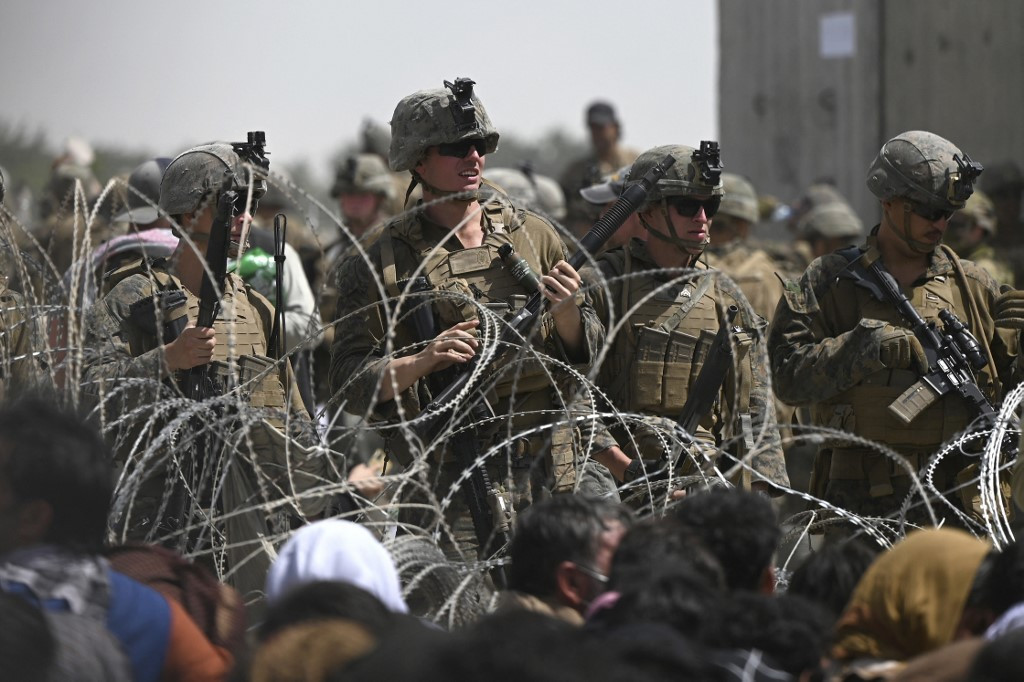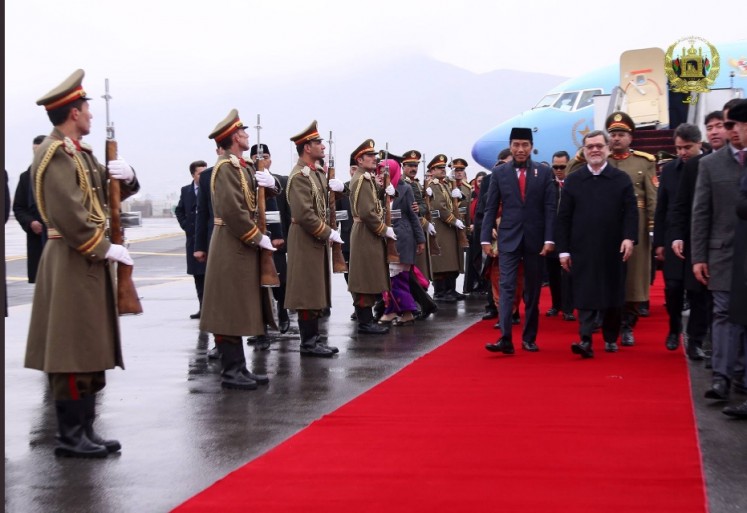Popular Reads
Top Results
Can't find what you're looking for?
View all search resultsPopular Reads
Top Results
Can't find what you're looking for?
View all search resultsWhat does the Taliban’s victory in Afghanistan mean for Indonesia?
Some of Indonesia’s grassroots Muslim groups appear to be giving the Taliban the benefit of the doubt, despite some looming concerns that their victory in Afghanistan could embolden domestic extremist groups.
Change text size
Gift Premium Articles
to Anyone
The government is closely monitoring developments in Afghanistan following the Taliban’s recent return to power.
In the meantime, Indonesia’s grassroots Muslim groups appear to be giving the militant group the benefit of the doubt, despite some looming concerns that the victory could embolden local extremist groups.
Last week, after the Taliban declared it was taking back control over the country after being ousted by United States-led forces 20 years ago, the Indonesian Foreign Ministry issued a statement saying it was hoping for an “Afghan-owned, Afghan-led” political settlement.
“Peace and stability is no doubt what the Afghan people and the international community truly wish for,” the ministry said.
Indonesia’s initial plan had been to “continue our diplomatic mission in Kabul with a small team” but now its Afghanistan diplomatic mission has been moved to Pakistan due to an unspecified “new development”, Foreign Minister Retno LP Marsudi said on Saturday.
For their part, the Taliban promised a “positively different” regime from the one that was ousted for harboring Osama Bin Laden, the Al-Qaeda mastermind behind the Sept. 11, 2001 terror attack in the US.
“If the question is based on ideology and beliefs, there is no difference […] but if we calculate it based on experience, maturity, and insight, no doubt there are many differences,” said Taliban spokesman Zabihullah Mujahid in a press conference on Tuesday, as quoted by AFP.
The group also promised to “connect with all sides”.
Read also: Discourse: The absence of violence today is best for Afghanistan: Kalla
Indonesia’s stakes
Up until the Taliban’s successful advance, Indonesia had been a close partner of the previous regime, having facilitated the Afghan peace talks between the government and the Taliban alongside others like the US, Qatar, Germany, Norway and Uzbekistan.
President Ashraf Ghani, who fled to the United Arab Emirates last week after announcing his government’s loss to the Taliban, had personally appealed to President Joko “Jokowi” Widodo for help with the peace process.
Indonesia, the nation with the world’s largest Muslim population, which was in the midst of cultivating an image of a moderate Islam that is compatible with democracy, had also engaged with the Taliban, earning their respect.
Former vice president Jusuf Kalla, who was instrumental in the Aceh peace talks of the early 2000s, led Indonesia’s diplomatic charge, which included hosting a trilateral ulema conference with Pakistan and Afghanistan and inviting the Taliban’s top leader, Abdul Ghani Baradar, to speak to Indonesian Muslim groups in 2019.
Because of the group’s official designation as non-state actors (and as a terrorist group in some countries), Jakarta at the time had to get permission from the United Nations to invite the Taliban and keep its engagement discreet.
The Foreign Ministry’s director-general for Asia, Pacific and African affairs, Abdul Kadir Jailani, met virtually with the deputy chief of the Taliban’s political office on Aug. 14 to say Indonesia was a “committed honest broker” willing to facilitate the peace process that was taking place in the Qatari capital of Doha prior to the insurgents’ victory.
Read also: Dozens of evacuees from Afghanistan arrive in Jakarta
Grassroots divided
With the latest developments in Afghanistan, various Islamic groups in Indonesia are keeping close watch.
Said Aqil Siradj, the chairman of Indonesia’s largest Islamic mass organization Nadhlatul Ulama (NU), warned that the Taliban victory in Afghanistan could motivate radicalized people to strive for a similar fate in Indonesia.
“We must remain vigilant as a result. The NU, the Indonesian Military, the National Police and all other components of this nation must come together even more and consolidate ranks,” the scholar said late on Thursday during a virtual event commemorating Independence Day, as reported on the NU website.
Meanwhile, Abdul Mu’ti, the secretary-general of the country’s second largest Muslim group Muhammadiyah, took a different view and focused on Indonesia’s potential role in influencing the Taliban.
There was no reason for Indonesia not to recognize the Taliban if they go on to form a legitimate government, he told The Jakarta Post, adding that the nation could engage them “not in the context of how we alter their religious understanding, but how they can be more open to various universal issues such as human rights, democracy, anti-corruption and women’s empowerment”.
President Joko "Jokowi" Widodo arrives in the capital city of Afghanistan, Kabul, for a state visit on Jan. 29, 2018. (The Jakarta Post/Pajhowk Afghan News)Kalla also said last week he was convinced the Taliban regime would be different from its predecessor. “I believe the Taliban government is more open [and] has changed a lot compared to their first time [governing] in 1996-2001,” he said in a press conference last Monday.
Sudarnoto Abdul Hakim from the Indonesian Ulema Council (MUI) echoed the optimistic view, saying that Indonesia should consider the political processes in Afghanistan as the country’s internal affairs and respect its sovereignty, “as long as it does not disturb the stability of the region, including in Southeast Asia.”
Despite some initial signs of support, not all of Indonesia’s Muslim groups agree on how to perceive the Taliban’s victory.
Analysts believe this could be attributed to the fact that moderate groups like the NU and Muhammadiyah have in the past demonized the Taliban as part of efforts to promote a more moderate strain of Islam in Indonesia.
Read also: Indonesia ‘deeply concerned’ over violence in Afghanistan
Buoying jihadists?
While the Taliban’s return to power was peaceful and bloodless for the most part, activists have warned of a spate of violence committed in the lead-up to the group’s power grab.
Amnesty International has said that its researchers found proof that Taliban fighters killed in July members of the Hazara minority group that they persecuted in the past, and that many more killings may have gone unreported.
For Indonesia, the Taliban’s recent success and its past inclination to violence has raised some concerns that it could embolden violent extremist groups such as Jemaah Islamiyah, an Al-Qaeda-affiliated organization responsible for major terror attacks in the country in the early 2000s.
However, some early analyses caution against overstating this possibility.
Azyumardi Azra, a prominent Muslim scholar and a professor of Islamic studies at Syarif Hidayatullah State Islamic University, said there was certainly going to be some level of “euphoria” among JI jihadists but that it was “unlikely” to result in the rise of extremists in Indonesia.
Separately, Centre for Strategic and International Studies (CSIS) researcher Alif Satria said while it may not result in any direct influences, the Taliban’s victory may still inspire jihadists taking it as proof that Ukhuwah Islamiyah (the Islamic brotherhood) – a previously narrow reading of Islamic supremacy over other beliefs – could still win out.
Alif said the key factor now is whether the Taliban would still support extreme ideologies and whether they would welcome jihadists to the country for combat training.
“We have to wait for the Taliban to respond. If they express support for jihadist ideologies and open their borders [to them], then there is a risk of inspiring terrorists from Indonesia and give them an opportunity to go to Afghanistan to train,” he told the Post last week.
Read also: Long term solution for refugees sought
Long-term concerns
Unlike the Islamic State-affiliated homegrown terrorist group Jamaah Ansharut Daulah (JAD), which focuses more on quick lone-wolf attacks, Alif said JI has the capacity to replicate the Taliban’s success in Afghanistan due to a centralized structure that focuses on amassing more followers through dakwah (religious outreach).
He said the recent victory of the insurgents could inspire JI to become more active in recruiting and fundraising, rather than launch attacks before they are well-prepared.
“The threat is not short-term because [JI] are increasing their capacity to launch bigger attacks in the future, since they have never actually renounced violence,” he said.
Others believe the Taliban are likely to avoid jeopardizing their recent success by supporting ideological extremists.
On another note, Muhammadiyah’s Abdul Mu’ti suggests that Indonesia should be more concerned with the possible influx of Afghan refugees.
“I think we need to anticipate this problem more seriously, because we are currently struggling hard to overcome the COVID-19 pandemic. On the other hand, the possibility of Afghan refugees entering Indonesia is quite significant because many who intend to flee to Australia often get stranded in Indonesia because of Australia’s immigration policy,” he told the Post.
Afghans currently make up the largest group of refugees in Indonesia, with the UN refugee agency reporting in June that there are currently 7,490 Afghans in the country.











